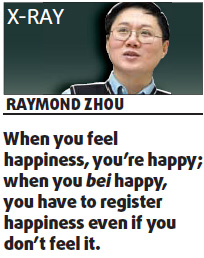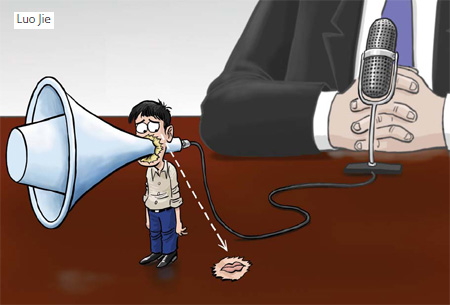
In March 2008, Li Guofu was found dead in a prison clinic. The local procurator said Li hanged himself. But Li's family did not buy into it.
Li was arrested because he had repeatedly filed charges against local officials of illegally appropriating land and building luxury office buildings. One of these buildings is for a district government office nicknamed "the White House". It actually looks like the Capitol.
After Li's death, his family raised many questions: How come there were bruises on his body? How could he hang himself from a beam that was no higher than himself? Where did he get the strip of cloth used around his neck? And why did the death certificate say it's a rope not cloth?
Before the truth of Li's death could be independently corroborated, the most accurate description may well be "Li Guofu was self-killed".
The Chinese verb for "committing suicide" is literally "self-kill". So, when we say "Someone self-killed", it means "Someone killed himself". But what does it mean when the sentence is twisted into "Li Guofu was self-killed"? In Chinese, it's "Li Guofu bei self-killed."
The Chinese word "bei" is the usual equivalent to translate an English verb of passive voice. But when a normal act has the possibility of being forced or coerced, bei is added before the verb, against grammatic convention, to convey this added layer of meaning. This has caught on and become a meme.
A slew of activities that are normally performed out of free will are suspected of being induced by outside forces, turning an active act into a passive one. However, unlike regular cases, the identity of the "forces" that act on the subject is not clear. "Li was self-killed" is an oxymoron of Chinese characteristics. It implies that Li is dead, the authority claimed he killed himself, but many believed otherwise.
Such is the beauty of language. It defies grammatical rules and captures the nuances of public sentiment.

In December 2008, a reporter by the name Guan Jian went missing in Shanxi province while investigating the misappropriation of land. Was he arrested? If so, his family and employer should have been notified within 24 hours, which is legally mandatory. Inquired of his whereabouts, the police said they would "make all efforts humanly possible" to find him.
It was not until 14 days later that the local police revealed Guan was in their custody on a charge of bribery. So, for that period of two weeks, Guan was "bei" missing, meaning he was forced into a state that gave the semblance of going AWOL.
These incidents show the tug of war between those with power and those without it. Neither side dared to openly challenge the law, but wanted to have the law on their side, at least something that looked like it. Instead of hiring a bunch of thugs to kill a whistle-blower or a snail-house owner, one who guards his right to his property against incredible odds, which some real estate developers were accused of, those in powerful positions often put up a facade of holding up justice while violating it. Call it hypocrisy.
But their failure to cook up a better story is not because they didn't try, but because they are by nature clumsy hiding the smoking gun.
And we have to give credit to the Internet and its online sleuths and self-appointed jury for refusing to let a suspicious case die in a hastily reached verdict. The media shone a light on it, the public raised questions, higher authorities were alerted, and many a travesty of justice was averted at the last minute.
Which is cause for both joy and frustration. It is possible to have justice in our society, but at what cost? Why does it have to be so difficult? With each of these episodes, more people lose their confidence in the system. The paradoxical use of a transitive verb is the satirical approach by which the public vents its helplessness and criticizes the abuse of power.
If this topic is too heavy, let's change to something lighter. In a recent survey to gauge public contentment, Beijing edged out Shanghai and became China's "happiest city".
The poll was done by installing a set of smiley faces and a crying face at 10 bus stops in each city. If a passerby felt happy, he or she should press the smiley face. Of the 820,000 Beijingers who participated, 56.06% pressed the smiley face.
Researchers found that the buttons near a park had more happy pressers while those near a hospital had more unhappy ones. That makes sense. Only the methodology sounds more entertaining than scientific, which yielded the term "bei happy". What if someone kept pressing one button to distort the data?
